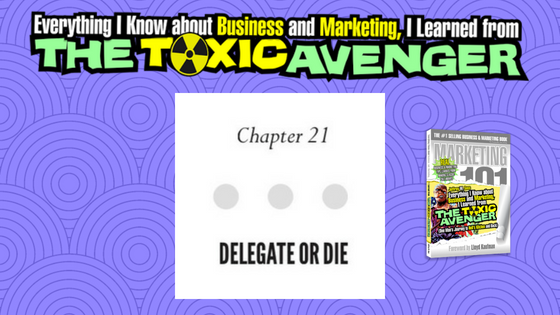Chapter 21: Delegate or Die
Greetings from Tromaville! Here is Chapter 21 of my book, Everything I Know about Business and Marketing, I Learned from THE TOXIC AVENGER. This chapter explores the importance of letting go and surrounding yourself with smarter, better people, and letting them do the things they are good at (while you do the things you are best suited for!)
If you haven’t done so already, you can read the Foreword by Troma co-founder, Lloyd Kaufman, and the Introduction to the book as well as Chapter 1, 2, 3, 4, 5 and 6, 7 ,8, 9, 10, 11, 12, 13, 14, 15, 16, 17, 18, 19 and 20. You can also see me read a few chapters live, along with Lloyd and Toxie, at Florida Supercon as well as a few chapters I read on Facebook Live. Stay tuned for additional chapters to be published here. If you like what you read and can’t wait for more, please don’t be shy. You can buy the book now on Amazon (and also please don’t be shy about sharing, and reviewing the book when you do read it.) Both Toxie and I greatly appreciate your support! – Jeff Sass
Chapter 21: Delegate or Die
One thing that is very clear about making a movie is that it is a collaborative art. Other than for a very few, very rare exceptions, making a film means working with a team. Even the smallest production has actors, crew, and a director at the least. Unlike writing or painting or sculpting, where your art can truly be the pursuit of a sole proprietor, making a movie is almost always a collaboration, and more often than not, puts OPM (other people’s money) at risk. That means pressure to perform.
Such that it is a collaborative art, the fine art of effective delegation becomes an invaluable skill for a filmmaker. The “auteur” theory notwithstanding, when making a film you really cannot do everything yourself. The best filmmakers recognize this and surround themselves with outstanding talent, from the DP and cinematographer to the actors and actresses, the grips and sound people, as well as the costume and set designers, and every other department head. In truth, the best directors don’t need to know how to do everything themselves, but rather they need to know how to surround themselves with the folks who do know everything, and they need to be an effective commander in chief, smartly delegating the tasks necessary to achieve their particular vision for the film.
No small task, but a great business lesson.
Too many entrepreneurs think they can and must do everything themselves. That might work when they are a bootstrapped team of two founders, but as soon as you take in your first Angel round or Series A, you have an obligation to your investors and no longer just to yourself and your “vision.”
Understanding how to delegate is perhaps the most valuable thing an entrepreneur can learn. Doing everything yourself does not scale. Being able to delegate well is akin to being able to lead well, and frankly, to being able to get shit done. And effective delegation is not easy. When it comes to managing a team, there is no such thing as “set it and forget it.” Just because you have assigned a task to someone doesn’t mean you have absolved yourself from it. As the director (i.e., “the boss”) you are ultimately responsible for it all, regardless of who actually executed the task. If all goes awry, it is you who should (and will) get executed (alongside your loyal, but ineffective, lieutenants). A good filmmaker, like a good businessperson, knows to “inspect what they expect” and monitor and check up on the tasks they have assigned to others.
On a movie set, it is not uncommon to have a short meeting with department heads late at night, to review the schedule for the next day and ensure, while there is still time to make adjustments, that everything delegated has been taken care of and is ready to go for the morning and day ahead.
This kind of department head huddle is a good practice for any business. Check-in and check up, to avoid having to check out!
•••
That’s Chapter 21 – How are you at delegating tasks and responsibilities? When you do, do you inspect what you expect? Stay tuned for Chapter 22: “Location, Location, Location” which explores the importance of relationships and finding (and utilizing) people’s hidden talents.
The book in previous posts:
Foreword, by Lloyd Kaufman
Introduction: Lights, Camera, Action!
Chapter 1: Welcome to Tromaville!
Chapter 2: The Troma Building
Chapter 3: Meet the Moguls
Chapter 4: Trailer Trash
Chapters 5 and 6: Working FREE-lance & Becoming a Full-time Tromite
Chapter 7: Branding Begins on the Ground Floor
Chapter 8: The Power of We
Chapter 9: Old Yeller (and Be Your Brand)
Chapter 10: Find Something to Believe In
Chapter 11: Show Up!
Chapter 12: Sink or Swim!
Chapter 13: Embrace your Vision and Culture!
Chapter 14: Strategic Partners – Burn Houses, Not Bridges
Chapter 15: If You Don’t Want to Swallow a Frog, Start with a Stunt
Chapter 16: Repurpose, On Purpose!
Chapter 17: Always Salute the Schwag!
Chapter 18: Playing by the Rules
Chapter 19: Fix it, or Forget it… Fast!
Chapter 20: This Means WAR!




